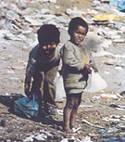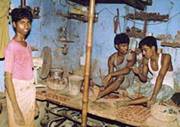
Find them thronging on the streets of bustling cities. Life lies in the dump of wastes for these thousands of little rag-pickers across the country. The bigger the city, more are they in number. The hunting ground ranges from dustbins to hospital dump-yards. Nothing is untouchable. From plastic to metals, old batteries and used surgical gloves, whatever is recyclable has its own value to them. The collection is paid for a few bucks and the cruelest of the diseases. Common are tuberculosis and skin diseases.


